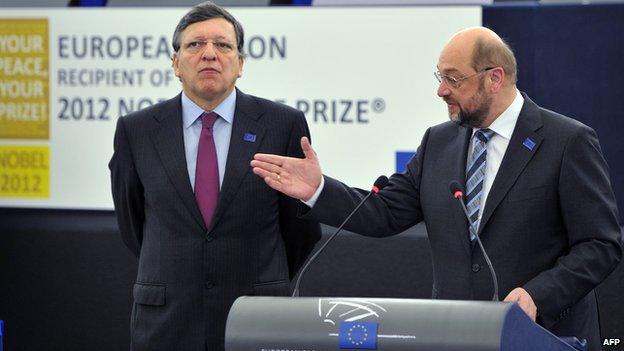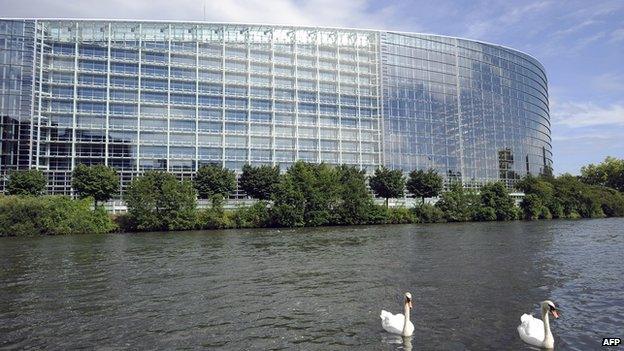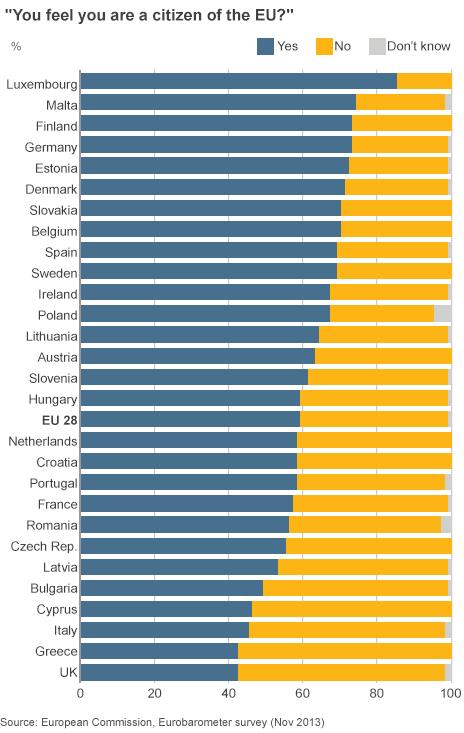Can race for EU top job pull in voters?
- Published
European elections: Bid to increase voter turnout
For the first time, the big pan-European political groups are choosing their preferred candidates to be the next head of the EU's executive body, the European Commission.
Also for the first time, MEPs will vote on the candidate eventually proposed by the European Council.
There is just three months to go before voters cast their ballots in this year's European Parliament elections.
Picking candidates for Commission president is not without controversy, because many national EU leaders still insist that the choice remains their prerogative.
But the idea is to try to persuade voters that they can have a role in picking the people who will run the EU's main institutions over the next five years.
"This time it's different" is one of the slogans the parliament is using, external to try to inspire a get-out-the-vote campaign. Overall turnout has fallen at each European election in the last 30 years, from a high of nearly 62% in 1979, and many politicians are hoping to reverse that trend.

German Socialist Martin Schulz (right) wants to succeed Commission President Jose Manuel Barroso (left)
Anti-EU candidates
"This time it is different," said the veteran British journalist Geoff Meade. "This time you'll get a third of elected MEPs coming back here who don't believe in the institution they've just been elected to serve."
Mr Meade has covered every EU vote since direct elections to parliament began in 1979.
"On Day One of those first euro elections someone said to me, 'Will anyone know the name of the MEP they are voting for?' And the answer then was no, and I'm afraid the answer now is almost certainly no as well."
Hence the idea that the elections should also be used to help choose the next president of the Commission. But questions are already being raised about whether the candidates being proposed by the parliamentary groups can be seen as voices for the future, or simply blasts from the past.

Strasbourg symbolises Franco-German peace - but most MEPs would rather not go there every month
'Core' Europe
The journey from one seat of the European Parliament to another - from Brussels to Strasbourg - takes you through the heart of the old European Union: from Belgium to Luxembourg across the Ardennes, and then down the Franco-German border.
And by accident or design, the most likely official candidates to be the next Commission president all have their political roots here.
The Liberal candidate Guy Verhofstadt is an MEP and former prime minister of Belgium; the Socialist candidate Martin Schulz, president of the European Parliament, is from just across the border in Germany.
And the favourite to be the candidate of the main centre-right group - the European People's Party (EPP) - is Jean-Claude Juncker. Until recently he was prime minister of Luxembourg and chairman of the eurozone finance ministers (the Eurogroup).
In other words, they are all euro-insiders. So are they the right people to inspire a rather weary electorate to cast large numbers of votes?
At a cafe in Luxembourg, I met up with a group of university students to discuss voter disillusion, and whether the candidates for the Commission job are actually part of the problem.
"I would strongly contradict the idea that they are from the European bubble, as you put it," said Mechthild Herzog from Weimar in Germany.
"The European Union is a highly complex construction and to bring it forward you need to know it from the inside."
Frustrated voters
But there is a general feeling among these students of European politics that, inevitably, the economic crisis in the eurozone has made the political challenges ever greater.
"People lost their jobs, people are suffering, and the European Union is not working," said Nuno Lucas da Costa from Portugal.

"When [people] vote for extreme right parties I don't think they are racist, they just want to vote against the system."
And in an election being held in 28 separate countries, it is difficult - to say the least - to find any candidate with anything approaching universal appeal, or even recognition.
The British conservative MEP Daniel Hannan used the tried and tested technique of asking random voters in several countries if they recognised photos of any of the main Commission candidates.
"No", "er, no," and "no, I don't think so" gave a flavour of the replies.
"It won't do to say that people will take more interest as the EU takes more power," Mr Hannan argued. "The EU has been taking more power for 35 years and [election] turnout keeps falling."
How much haggling?
It is hardly surprising that the UK Conservatives' political group in Europe, the ECR, is not backing any candidate for Commission president, nor are other groups on the Eurosceptic side of the debate.
But Euro-enthusiasts are determined to press the idea that giving parliament a greater role in making senior appointments will make the whole process more democratic.
"You might be surprised that even an old hand can have fresh ideas," said Richard Corbett, who was once a Labour MEP, and is running to be one again.
"Whether it will work exactly at European level, who knows? This is the first time it is being tried."
"[But] instead of leaving the choice for Commission president to be haggled over behind closed doors after the election, the parties are saying before the election that this is our preferred candidate."
Dark horse candidate?
In some ways this is a test of strength, because the powers of the parliament have increased.
But many national leaders point out that the EU's Lisbon Treaty only calls upon them to "take account" of the result of the parliamentary elections, and they could choose to ignore altogether the candidates put forward by the parliamentary groups.
Plenty of other names have been mentioned in passing: among them the head of the IMF, Christine Lagarde, on the centre-right, and the Danish Prime Minister Helle Thorning-Schmidt on the centre-left. A compromise candidate could emerge unexpectedly at the last minute.
So could it really be different this time? The answer is at most a "maybe". Rather than less haggling behind closed doors, there could end up being rather more.